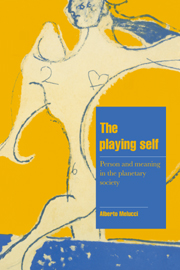Book contents
- Frontmatter
- Contents
- Introduction
- 1 The challenge of the everyday
- 2 Needs, identity, normality
- 3 Metamorphosis of the multiple self
- 4 The inner planet
- 5 Body as limit, body as message
- 6 On taking care
- 7 The abyss of difference
- 8 Amorous senses
- 9 Inhabiting the earth
- 10 A eulogy to wonder
- Epilogue
- Bibliographical note
- References
- Index
Epilogue
Published online by Cambridge University Press: 04 October 2009
- Frontmatter
- Contents
- Introduction
- 1 The challenge of the everyday
- 2 Needs, identity, normality
- 3 Metamorphosis of the multiple self
- 4 The inner planet
- 5 Body as limit, body as message
- 6 On taking care
- 7 The abyss of difference
- 8 Amorous senses
- 9 Inhabiting the earth
- 10 A eulogy to wonder
- Epilogue
- Bibliographical note
- References
- Index
Summary
Information has today become a central resource and contemporary societies depend on it for their survival and development. The capability of collecting, processing, and transferring information has been developed in the last thirty years to a level which for that period alone goes beyond comparison with all the achievements of the previous history of mankind. As a consequence, the artificial, ‘built’ character of social life has increased. A large part of our everyday experiences occur in an environment which is entirely produced by society. The media represent and reflect our actions; individuals incorporate and reproduce these messages in a sort of self-propelling spiral. Where are ‘nature’ and ‘reality’ outside the cultural representations and images we receive from and produce for our social world? The latter acquires altogether a planetary dimension, and the events are no longer important in themselves or not only for the place and the people where they occur, but for their symbolic impact on the world system.
Information societies develop a cultural production not directly connected to the needs for survival or for reproduction: in that they are ‘post-material’ societies and they produce a ‘cultural surplus’. Control over production, accumulation, and circulation of information depends on codes which organize information and make it understandable. In complex societies, power consists more and more of operational codes, formal rules, knowledge organizers. In its operational logic, information is not a shared resource accessible to everybody, but merely an empty sign, the key to which is controlled by few people only.
- Type
- Chapter
- Information
- The Playing SelfPerson and Meaning in the Planetary Society, pp. 144 - 154Publisher: Cambridge University PressPrint publication year: 1996

